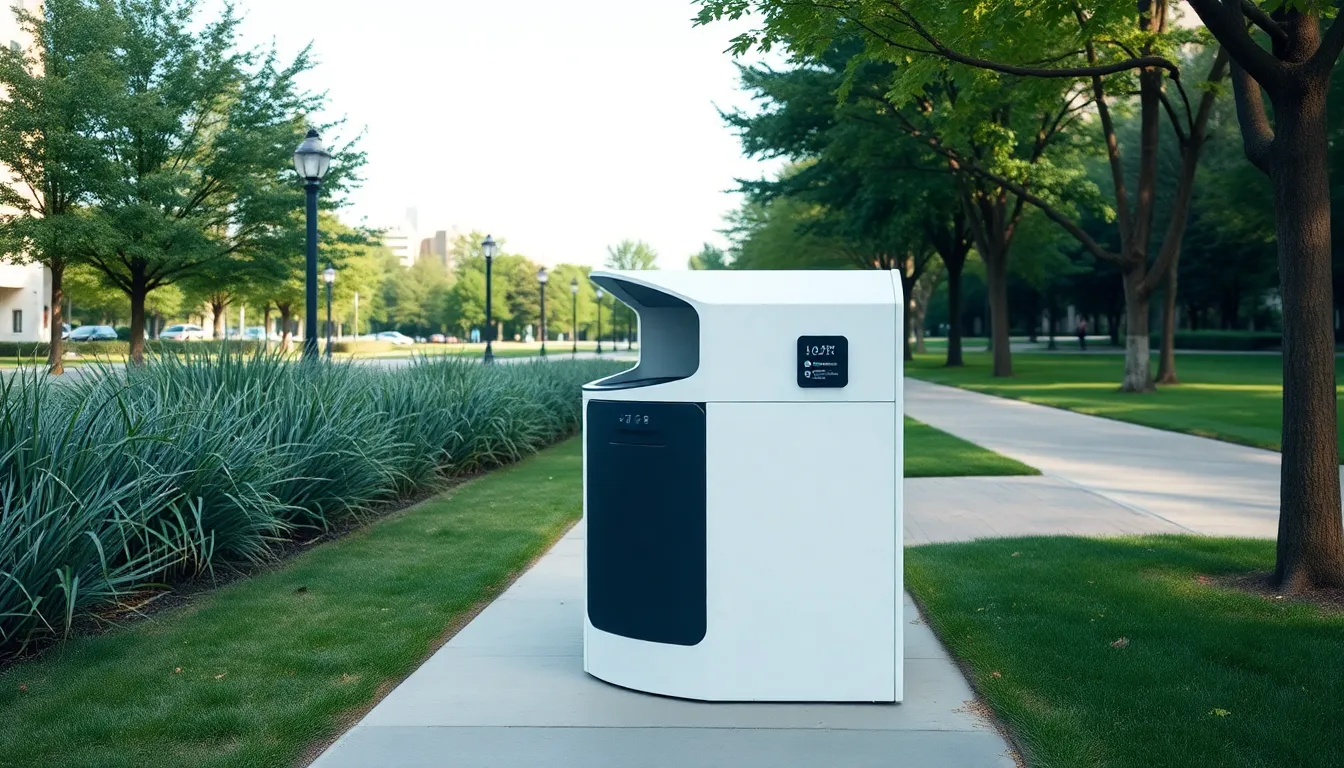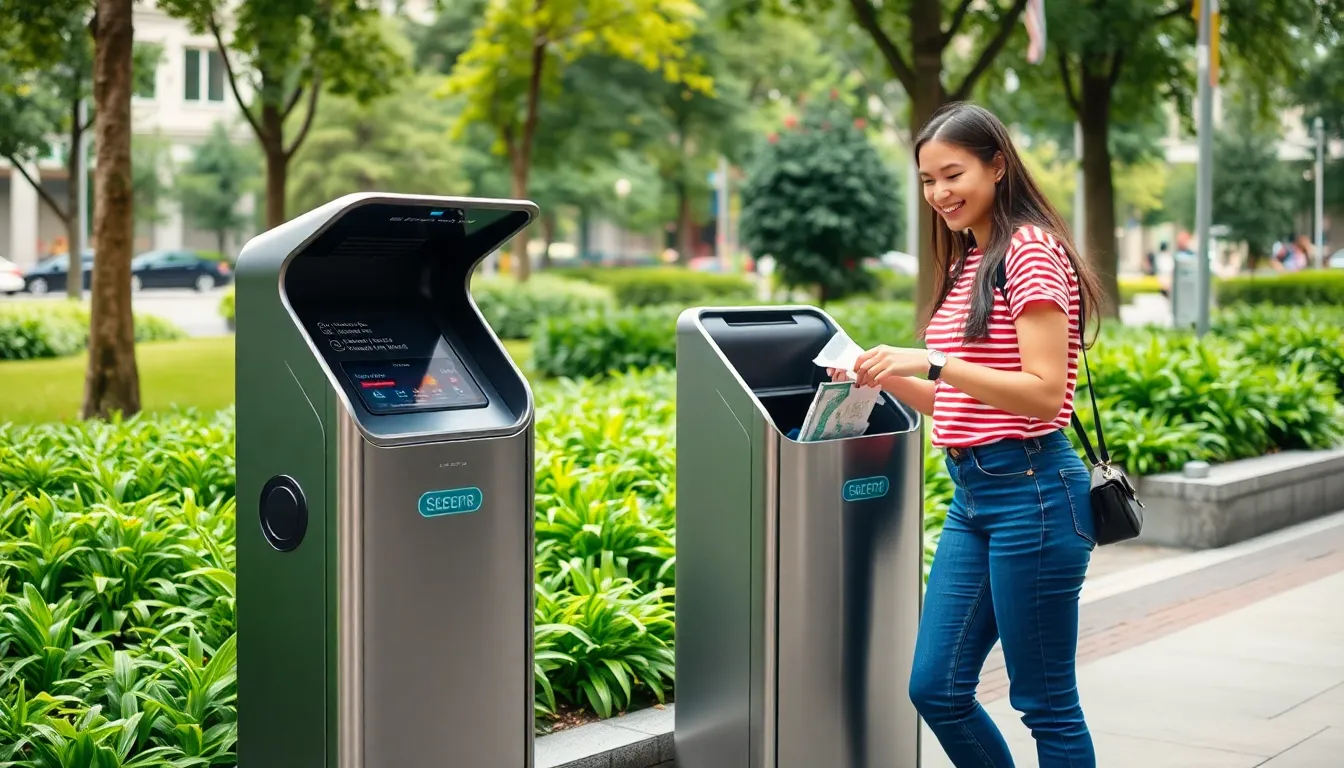Table of Contents
ToggleIn a world where even your toaster can connect to Wi-Fi, why are waste bins still playing catch-up? Enter the smart waste bin—a trash can that’s not just a receptacle but a tech-savvy companion. These bins are here to revolutionize the way we dispose of waste, making it cleaner, smarter, and maybe even a little more fun.
Imagine a bin that knows when it’s full and alerts you before it overflows like that one friend who always eats the last slice of pizza. With features like sensors and app connectivity, smart waste bins are not just about convenience; they’re about transforming our approach to waste management. It’s time to embrace the future and let our garbage cans do the heavy lifting—because who wouldn’t want a bin that’s smarter than some of their friends?
Overview Of Smart Waste Bins
Smart waste bins offer innovative solutions for modern waste disposal needs. Equipped with sensors, these bins detect when they reach capacity and send alerts to users, ensuring timely emptying. Enhanced connectivity via apps enables real-time monitoring, allowing for more efficient waste management practices.
Integration with smart city projects reflects a growing trend in urban infrastructure. Cities utilizing smart waste bins can optimize collection routes, reducing operational costs and environmental impact. These bins often include features such as compacting mechanisms, which increase storage capacity and decrease the frequency of pickups.
User experience improves through the interactive nature of smart bins. Engaging interfaces encourage proper recycling behaviors, providing educational prompts about waste sorting. By fostering awareness, these bins play a crucial role in promoting sustainability within communities.
Data analytics serve as another powerful aspect of smart waste bins. Collected data about waste generation patterns helps municipalities adapt services to community needs. This information identifies trends and can lead to changes in waste management strategies, enhancing overall efficiency.
Investment in smart waste management technologies reflects a commitment to eco-friendly practices and resource conservation. As cities continue to expand, integrating intelligent solutions like smart bins becomes essential for sustainable urban living. Through these advancements, society moves closer to achieving zero waste goals.
Key Features Of Smart Waste Bins

Smart waste bins incorporate advanced technologies to streamline waste management and optimize disposal processes. Their key features promote efficiency, sustainability, and user engagement.
Sensor Technology
Sensors detect fill levels, providing real-time data to users. They trigger alerts when bins approach capacity, preventing overflow and ensuring timely collection. Many bins also feature proximity sensors, activating lights or notifications to guide users toward proper disposal practices. Moreover, compliance with smart city initiatives enables integrated monitoring, enhancing municipal waste management strategies. Data generated from these sensors aids in understanding waste generation trends. By analyzing patterns, municipalities can adapt services effectively, leading to improved collection efficiency.
Compaction Mechanisms
Compaction mechanisms compress waste to maximize storage capacity. Using these systems reduces the frequency of pickups, resulting in lower collection costs and decreased environmental impact. These bins can handle larger waste volumes while maintaining compact footprints. Many compaction systems utilize hydraulics or electric motors, providing reliable operations. Enhanced capacity means fewer bins are needed in specific areas, simplifying waste management for municipalities. Increased efficiency through compacting ultimately supports cleaner, more sustainable urban environments.
Benefits Of Smart Waste Bins
Smart waste bins provide numerous advantages in waste management, particularly in environmental protection and financial savings.
Environmental Impact
Smart waste bins significantly reduce litter and enhance recycling rates. By providing real-time data, they help communities track waste patterns and adjust disposal strategies. With features like compaction technology, bins hold more waste, lessening the frequency of collection trips. Fewer trips mean reduced fuel consumption and lowered carbon emissions. These bins also promote proper waste segregation through user-friendly interfaces, encouraging users to recycle correctly. Enhanced recycling leads to lower landfill usage, which plays a vital role in conserving natural resources. Overall, smart waste bins align with sustainability goals, fostering cleaner urban environments.
Cost Efficiency
Cost efficiency rises with the implementation of smart waste bins. By optimizing collection routes, municipalities save on fuel and labor costs. Real-time alerts about bin capacity prevent unnecessary pickups, further minimizing operational expenses. Data analytics provide insights into waste generation, allowing for better allocation of resources based on community needs. Reduced overall collection frequency not only saves money but also extends the lifespan of waste management vehicles. Investments in smart waste bins lead to long-term savings for cities, benefiting taxpayers and enhancing public service delivery.
Challenges In Implementing Smart Waste Bins
Smart waste bins present several challenges that municipalities must navigate. Initial investments for purchasing and installing smart bins can be substantial. High-tech features like sensors, compaction mechanisms, and connectivity options often increase upfront costs. Depending on the size and scope of the installation, expenses can reach thousands of dollars per bin, especially when factoring in integration with existing waste management systems.
Maintenance and support also play crucial roles in the successful implementation of smart bins. Regular servicing is necessary to ensure sensors function correctly, software updates are conducted, and mechanical components operate smoothly. Failure to maintain these systems can lead to operational inefficiencies, increased downtime, and unexpected repair costs. Municipalities must allocate budget resources not only for initial investments but also for ongoing maintenance, creating planning challenges for city officials.
Future Trends In Smart Waste Bin Technology
Emerging trends in smart waste bin technology illustrate significant improvements in efficiency and user engagement. Enhanced integration with Internet of Things (IoT) devices facilitates seamless communication between bins and waste management systems, creating a smarter disposal experience.
Data-driven analytics play a crucial role in the development of these technologies. Municipalities can utilize insights gathered from user interactions and waste generation trends to optimize collection routes and schedules.
Innovative advancements like AI-powered sorting mechanisms are set to redefine recycling practices. By identifying various materials, these systems enable users to dispose of waste accurately, enhancing recycling rates and reducing contamination.
Incorporating renewable energy sources, such as solar panels, increases sustainability. Smart bins may harness solar power to support their operations, reducing reliance on external energy sources and lowering operational costs.
User interfaces are becoming more engaging and informative. Interactive screens on smart bins may feature educational content, nudging users to adopt better recycling habits and community awareness.
Mobile app connectivity continues to evolve, allowing users to report issues directly or receive notifications. Notifications about local recycling events or community challenges can encourage participation in sustainability efforts.
Cities might see increased collaboration with private companies specializing in waste management technology. Partnerships could lead to innovations in infrastructure and funding, making the transition to smart waste systems more feasible.
Overall, these trends suggest that smart waste bins will become integral to urban waste management strategies, driving advancements in sustainability while improving the efficiency of waste disposal practices.
Conclusion
Smart waste bins represent a significant leap forward in waste management technology. Their ability to monitor fill levels and optimize collection routes not only enhances efficiency but also promotes sustainable practices within communities. By encouraging proper recycling and reducing operational costs, these bins play a crucial role in achieving environmental goals.
As cities continue to embrace smart waste management solutions, the potential for cleaner urban environments becomes increasingly attainable. The integration of advanced technologies and data analytics ensures that municipalities can adapt to changing waste patterns effectively. Investing in smart waste bins is a step toward a more sustainable future, benefiting both communities and the environment.



